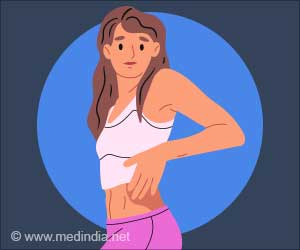Online shopping for workout clothes could result in negative body image consequences, particularly when the website imagery is body-focused.

Effects of Online Shopping Site Imagery on Women’s Body Image
Sales of “Athleisure” — a hybrid style of athletic clothing typically worn as everyday wear — have risen rapidly following the onset of COVID-19 and are expected to be worth more than $548 billion globally by 2024 (1✔ ✔Trusted SourceExploring the relationship between appearance-contingent self-worth and self-esteem: The roles of self-objectification and appearance anxiety
Go to source).
‘Adopting imagery focusing less on body parts and more on the whole person might prevent negative body image consequences in women.#MentalHealth #SelfEsteem #Attention’





The new studies use an eye-tracking experiment to explore online clothing shopping for activewear and its psychological outcomes. During laboratory sessions, women were randomly allocated to browse an activewear, casualwear, or home decor website for 15-20 minutes.Their body image and self-esteem were then measured using a combination of self-report and reaction time measures. After the shopping activity, researchers used eye-tracking technology to measure the women’s eye gaze behavior towards a new set of female images, to see if the websites they browsed led to changes in where they focused their attention.
Both studies found women felt worse about their looks and experienced lower self-esteem after browsing an activewear website. In comparison, browsing for casual clothing or homewares did not lead to negative body image or lower self-esteem.
Activewear retailers deliberately used body-focused marketing to promote their products, which tended to be tight, form-fitting, or revealing. This type of imagery can be very threatening to women’s body image because it promotes an idealized and difficult-to-attain physique.
How to Protect Body Image While Doing Online Shopping
The first experiment found an interesting pattern of attention when researchers tracked women’s eyes toward a new set of female images after the activewear shopping activity. Women who browsed for activewear showed much lower body gaze, meaning they preferred to gaze at faces, compared to women who browsed for casual wear.One potential reason for this finding is that women who browsed for activewear may have felt their body image was threatened by the body-focused imagery used by the activewear website. When body image is threatened, women may be less likely to continue looking at other women’s bodies after browsing for activewear because they feel more uncomfortable.
Advertisement
Gaze behaviour, body image in women and online apparel shopping
Go to source).
In one of the studies, they found a general reduction in negative moods across all the shopping websites, suggesting that online shopping might be used by women to alleviate negative moods by offering a distraction from everyday stresses.
Advertisement
Clothing retailers are under increasing pressure to operate in ethically responsible ways, such as reducing environmental impact or avoiding exploitative labor. However, minimizing the negative impact of retail imagery on the psychological well-being of consumers was also their responsibility.
These findings provide an impetus to explore alternative marketing strategies which achieve the retailer’s objectives while minimizing threats to the self-worth of consumers.
References:
- Exploring the relationship between appearance-contingent self-worth and self-esteem: The roles of self-objectification and appearance anxiety - (https://www.sciencedirect.com/science/article/abs/pii/S1740144517300141?via%3Dihub)
- Gaze behaviour, body image in women and online apparel shopping - (https://onlinelibrary.wiley.com/doi/10.1111/ijcs.12977)















